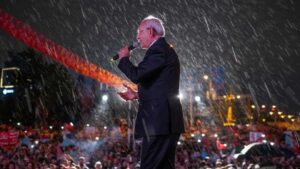Today, Turkey faces a potentially historic election where a group of six opposition parties have united with the shared goal of unseating President Recep Tayyip Erdogan. To do so is a significant challenge. Erdogan has run the country as its leader for almost 18 years. Despite the upcoming poll, the opposition’s campaign has been muted until recently. This has in part been due to the earthquake in February which overtook other political issues. However, in recent weeks, both Erdogan and his opponent, Kemal Kilicdaroglu, leader of the opposition CHP party, have completed multiple campaign events most days.Kilicdaroglu has promised, among other things, to reunify the country, reduce hostility, and improve the economy. Above all, he has pledged to restore Turkey as a parliamentary democracy and move away from the presidential system that Erdogan created. The looming election has highlighted the fragility of the country’s democracy.Erdogan’s campaign has primarily focused on expensive gifts. Among these is a reduced retirement age, the inauguration of a drone carrier, several mosques, high-speed trains, and even a gas pipeline. The leader transmitted most of these events live on Turkish television.
In the final days prior to the election, ORC, a reputable polling company, published surveys indicating that Kilicdaroglu led with 51.7%, while Erdogan was trailing with 44.2%. Such a win in the first round would have been a significant boost for the opposition. However, these surveys were conducted before the sudden departure of Muharrem Ince, an ex-party member of the CHP, which could impact the results.
The main challenge Erdogan faces is the country’s economic woes. Youth unemployment has reached close to 20%, and high inflation has significantly contributed to the financial challenges. The federal bank reports the inflation rate at 50%. Some believe that if Erdogan wins, then many Turkish people will leave the country.
Turkey Faces a Directional Election: Will Erdogan’s Era End?
Turkey faces an important election as six opposition parties have united to unseat President Recep Tayyip Erdogan. This is a significant challenge, given that Erdogan has led the country for almost 18 years. Recently, Erdogan and his opponent, Kemal Kilicdaroglu, the leader of the CHP party, have both been campaigning extensively throughout the country.
Kilicdaroglu has promised to unify the country, reduce hostility, and improve the economy. Above all, he has pledged to restore Turkey as a parliamentary democracy rather than a presidential system under Erdogan.
Erdogan has focused his campaign on expensive gifts, including the reduction of the retirement age and multiple openings of mosques, gas pipelines, and even a drone carrier. The Turkish leader has brought most of these events live on television.
Before the election, ORC, a reputable polling company, published a survey indicating that Kilicdaroglu led with 51.7%, while Erdogan was trailing with 44.2%.
Erdogan’s challenge has been the country’s economic woes. Youth unemployment has reached nearly 20%, and inflation is reportedly at 50%. Observers suggested that if Erdogan wins, significant numbers of Turkish people would leave the country.
However, many analysts have expressed concern that the government will not accept defeat. Interior Minister Süleyman Soylu, an Erdogan supporter, referred to a “west backed coup” if the opposition wins. The opposition is concerned about possible violence by government supporters in this situation.
The election saw increased aggression during the campaigns. On Friday, Kilicdaroglu appeared on stage in Ankara and Samsun with a bulletproof vest following warnings of an imminent attack.
The EU remains Turkey’s primary trading partner. Although Turkey may continue to have a difficult relationship with the West, it is not expected to entirely distance itself from Western nations, given strong trade links.
The polls will close at 5:00 pm Turkish time, and first results are expected at 7:00 pm German time. Parties are organizing their own election observers. The opposition alone fields half a million. Initiatives have also made it possible for individual voters to become election observers, with thousands of attorneys on hand to prevent irregularities.




























































